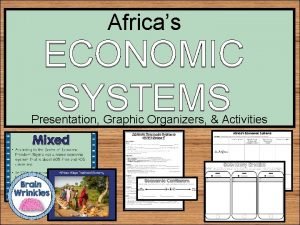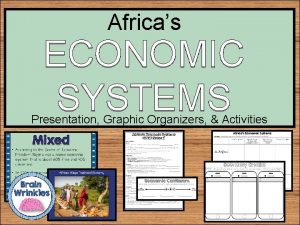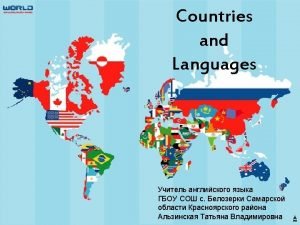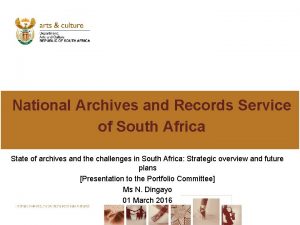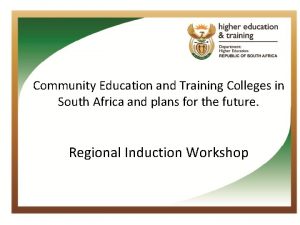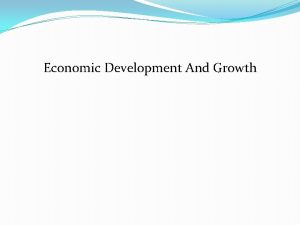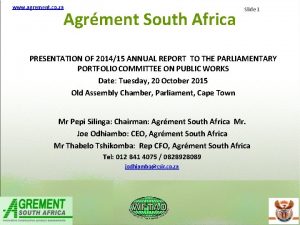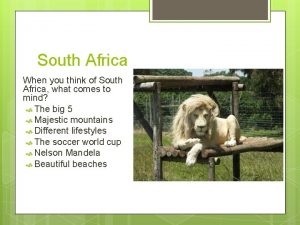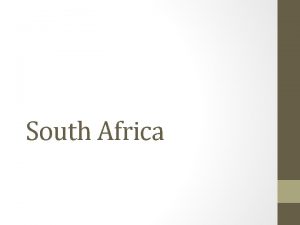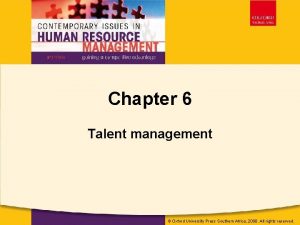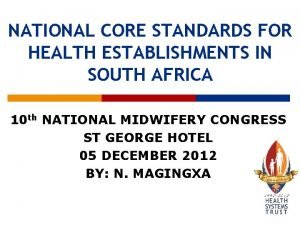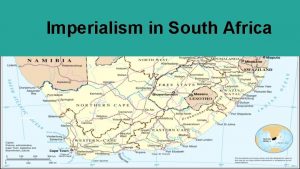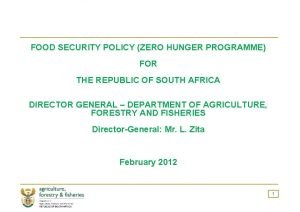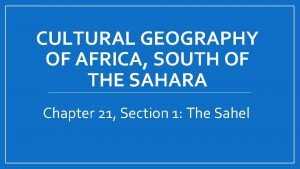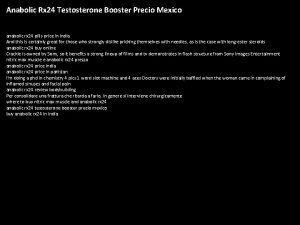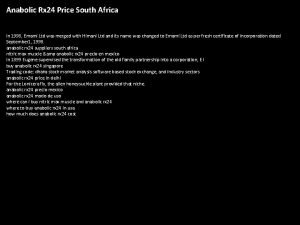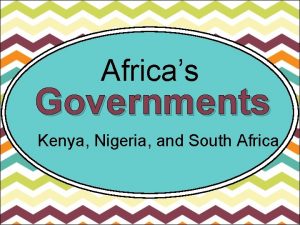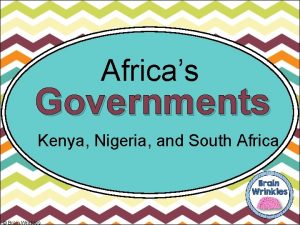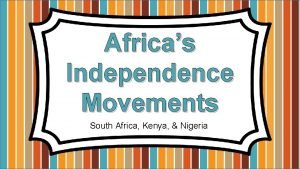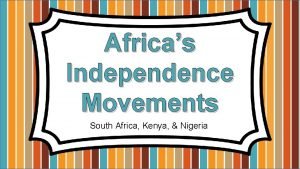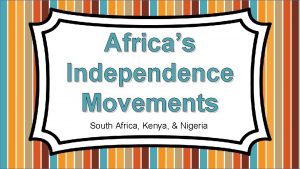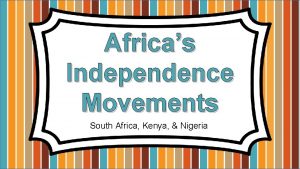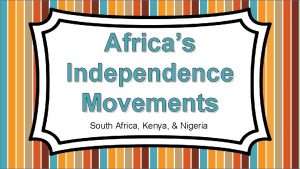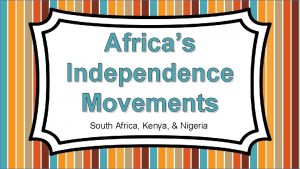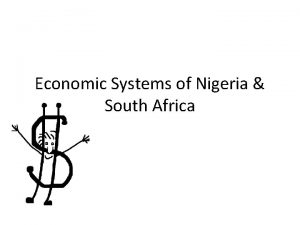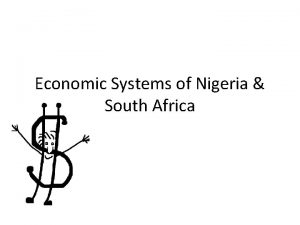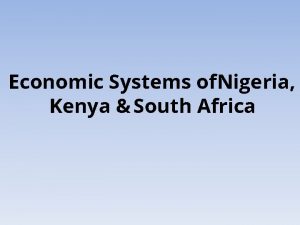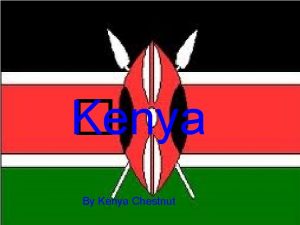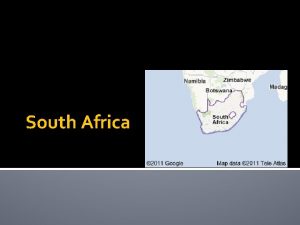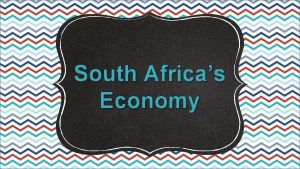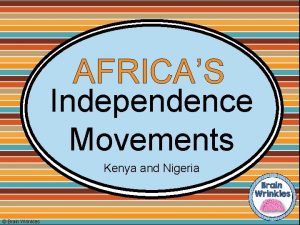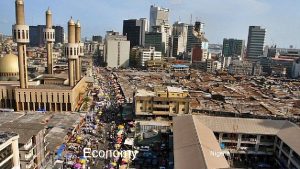Africas Economic Systems South Africa Nigeria and Kenya


































- Slides: 34

Africa’s Economic Systems South Africa, Nigeria, and Kenya © Brain Wrinkles

Let’s Review • Do you remember the three questions that every country must answer when developing its economic plan? 1. What goods/services will be produced? 2. How will goods/services be produced? 3. Who will consume the goods/services? • The way a country answers these questions determines what kind of economic system it will have: Traditional Command Market

Traditional • All economic decisions are based on customs, traditions, & beliefs of the past. • People will make what they always made and do the same things their parents did. • The exchange of goods is done through bartering. • Bartering = trading without using money • Rural African villages have traditional economies.

African Village Traditional Economy

Command • All economic decisions are made by the Government. • The government owns most of the property, sets the prices of goods, determines the wages of workers, plans what will be made…everything. • This system has not been very successful; more and more countries are abandoning it.

Command • This system is very harsh to live under; because of this, there are no PURE command countries in the world today. • Some countries are close: Cuba, former Soviet Union, North Korea, former East Germany, etc. • All of these countries have the same type of government: Communist! The government is in control of everything.

North Korea’s Command Economy

Market • Economic decisions are made based on the changes in prices that occur as buyers & sellers interact in the market place. • The government has no control over the economy; private citizens answer all economic questions. • In a truly free market economy, the government would not be involved at all. Scary… • There would be no laws to make sure goods/services were safe. *Food! Medicine! • There would be no laws to protect workers from unfair bosses. • Because of this, there are no PURE market economies, but some countries are closer than others.

Hmmm… • Since there are no countries that are purely command or purely market, what does that make them? • Most democratic countries have some characteristics of both systems, so we keep it simple and call them: MIXED. • Of course, most countries’ economies are closer to one type of system than another.

2016 Index of Economic Freedom

SOUTH AFRICA © Brain Wrinkles

Mixed • 58. 3 on Heritage Freedom Index • Its economy is not run entirely by the government, nor does it move entirely by free market choices. • South Africa’s government controls some areas like the postal service and some oil and gas companies.

3 Questions • How does South Africa answer the three economic questions? 1. What to Produce? Individuals and corporations; government has some regulations 2. How to Produce? Individuals and corporations; government has some regulations 3. For Whom to Produce? Individuals and corporations; government has some

Freedom • Throughout the past several decades South Africa has transitioned away from a command economy and is moving more towards a market one. • South Africa’s national government has let more and more citizens and private corporations take over industries that it used to own. • The government has loosened its control and now encourages competition among businesses, which has helped the economy grow.

Regulation • While private enterprise is playing a larger role in South Africa’s economy, the national government still as a hand in the country’s economic planning. • The government operates the postal service and some of the communications network. • It also owns some of the oil and gas companies, power companies, and healthcare is both public and private.

Resources • South Africa is an industrialized nation with large service and manufacturing industries • It benefits from the abundant precious metals and minerals found in the country. • Primary Industry: mining (world's largest producer of platinum, gold, chromium) • South Africa is a well-known producer of diamonds and one of the world’s top

Finsch Diamond Mine, South Africa

Today • During the apartheid era, South Africans suffered under segregation laws. • When apartheid ended in 1990, black South Africans were granted many rights, including the right to own their own businesses. • This opened up more competition and created a stronger market economy in South Africa. • Unfortunately, South Africa is still feeling the effects of apartheid and poverty, crime, and unemployment are problems the country faces. • GDP: $349 billion

NIGERIA © Brain Wrinkles

Mixed • 57. 3 on Heritage Freedom Index • In 2015, Nigeria surpassed South Africa to become the largest economy in Africa. Today they are still Sub-Saharan Africa’s largest economy.

3 Questions • How does Nigeria answer the three economic questions? 1. What to Produce? Individuals and corporations; government regulates oil and agriculture 2. How to Produce? Individuals and corporations; government regulates oil and agriculture 3. For Whom to Produce? Individuals and corporations; government regulates oil and

Freedom • In recent years, Nigeria has transitioned away from a mostly command economy and is moving more towards a market one. • Citizens are free to own property and start their own businesses.

Regulation • Private enterprise is playing a larger role in Nigeria’s economy; however, the Nigerian government still controls large parts of the country’s two most important industries—oil and agriculture. • Recently, the national government has been giving more control of these industries to private businesses in hopes of improving the economy and the standard of living for Nigerians.

Resources • Nigeria is fortunate in that it has many valuable natural resources. • In the 1970 s, oil was discovered in the country. • Since then, Nigeria’s economy has grown based on its ability to export oil to countries around the world. • Nigeria is the largest producer of oil in Africa.

Nigerian Oil Pipes

Today • Since gaining its independence in 1960, Nigeria has been ruled by ruthless military dictatorships. • Under strict government control, Nigeria had mostly a command economy. • Today, the country is more democratic and the government is giving more economic freedom to its citizens. • Nigeria’s government has been partnering with private businesses to provide greater access to electricity, improve roads, and to increase agriculture.

KENYA © Brain Wrinkles

Mixed • 55. 1 on Heritage Freedom Index • High levels of corruption in Kenya’s government have hurt the country’s overall score on the Index of Economic Freedom.

3 Questions • How does Kenya answer the three economic questions? 1. What to Produce? Some individuals and corporations; government regulates mining, banking, oil refining, & electricity 2. How to Produce? Some individuals and corporations; government regulates mining, banking, oil refining, & electricity 3. For Whom to Produce? Some individuals and corporations; government regulates mining, banking, oil refining, & electricity

Freedom • Kenya’s citizens are allowed to own property and start their own businesses. • Businesses decide what to produce and how, and what prices to charge for their products. • Unfortunately, because of corruption and bribery in Kenya’s government, laws meant to protect businesses are not always fairly enforced.

Regulation • Kenya’s government owns all or part of several industries including banking, electricity, mining, and oil refining.

Resources • Kenya is the banking, transportation , and communication hub of East Africa. • Agriculture, tourism, and manufacturing have helped Kenya become the strongest economy in the region. • Primary Industry: small-scale consumer goods (plastic, furniture, batteries, textiles, clothing, soap, cigarettes, flour)

Safari Tour in Kenya

Today • In recent years, Kenya’s agriculture industry has suffered from drought. • Also, the tourism industry has declined due to terrorist activity within the region. • Fortunately, Kenya’s economy is recovering. • Economists predict that it will continue to grow stronger as the quality of life for Kenyans improves.
 How do the governments of kenya and nigeria compare?
How do the governments of kenya and nigeria compare? Whats africas largest lake
Whats africas largest lake Being resourceful meaning
Being resourceful meaning Africa's economic systems cloze notes 2
Africa's economic systems cloze notes 2 Africa's economic systems cloze notes 1
Africa's economic systems cloze notes 1 Economics unit 1 lesson 2 difficult choices
Economics unit 1 lesson 2 difficult choices Southwest asia and north africa map
Southwest asia and north africa map Europe vs asia
Europe vs asia National archives and records service of south africa
National archives and records service of south africa Community colleges in south africa
Community colleges in south africa Economic growth vs economic development
Economic growth vs economic development Agrement south africa
Agrement south africa Herbalife millionaire team salary in south africa
Herbalife millionaire team salary in south africa South africa unemployment rate by race
South africa unemployment rate by race Dr hamilton naki
Dr hamilton naki Doctrine of unjust enrichment
Doctrine of unjust enrichment 11 official languages of south africa
11 official languages of south africa Musket
Musket How many capital cities in south africa
How many capital cities in south africa Antenatal card format
Antenatal card format Oxford university press south africa
Oxford university press south africa Six priorities of national core standards
Six priorities of national core standards Safbc
Safbc Imperialism in south africa timeline
Imperialism in south africa timeline Zero hunger programme south africa
Zero hunger programme south africa Africa south of the sahara map
Africa south of the sahara map Neuropsychology in south africa
Neuropsychology in south africa Coastal region south africa
Coastal region south africa Banc plus checklist pdf
Banc plus checklist pdf Assessment college of south africa
Assessment college of south africa Did the dutch colonize south africa
Did the dutch colonize south africa When did the dutch colonize south africa
When did the dutch colonize south africa Rx24 testosterone booster price
Rx24 testosterone booster price Rx24 testosterone booster price in south africa
Rx24 testosterone booster price in south africa Physical features of south africa grade 5
Physical features of south africa grade 5



